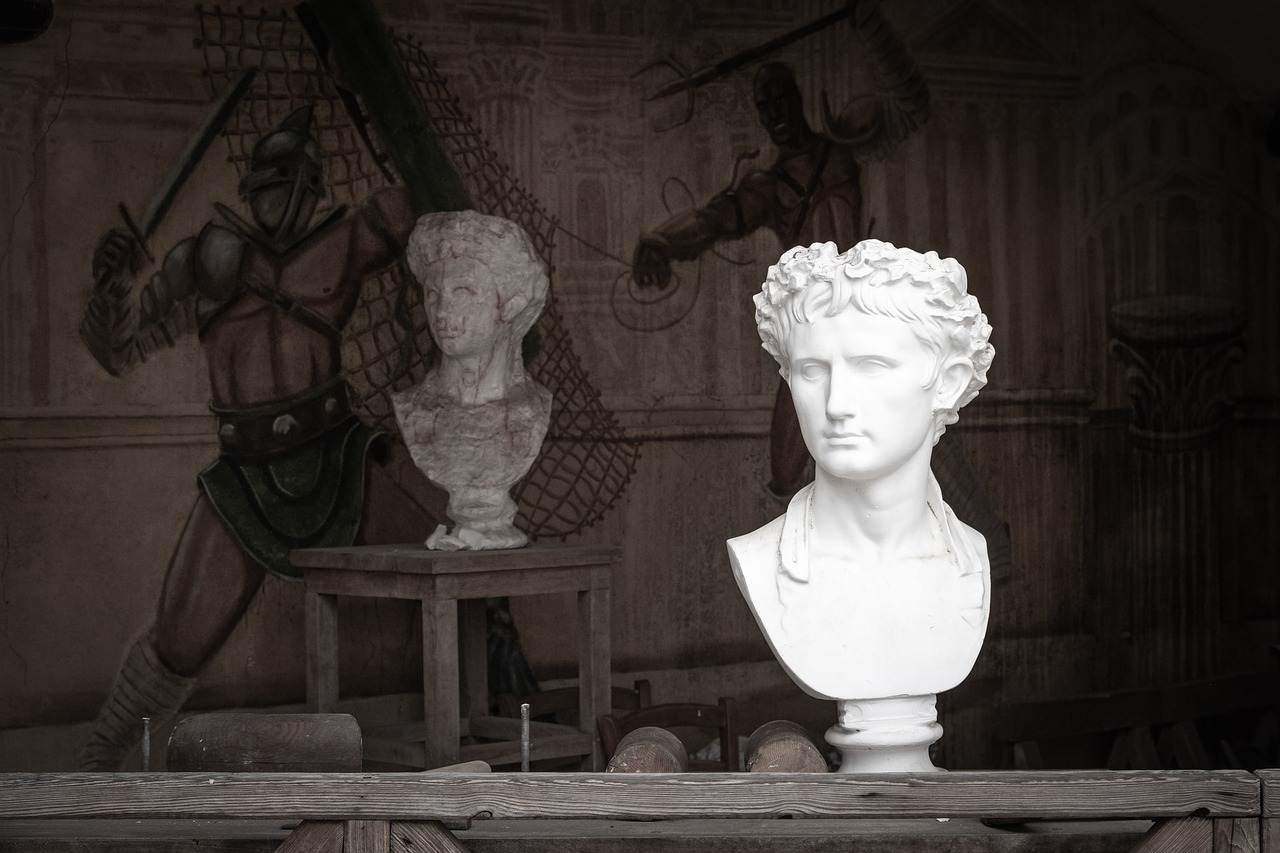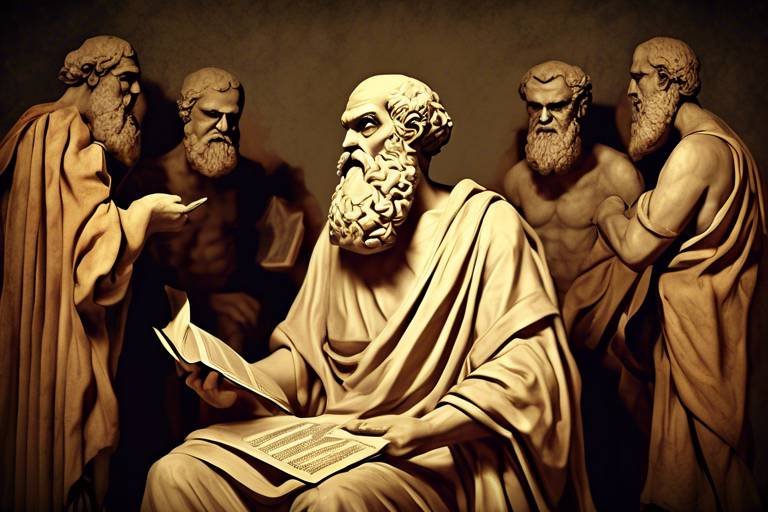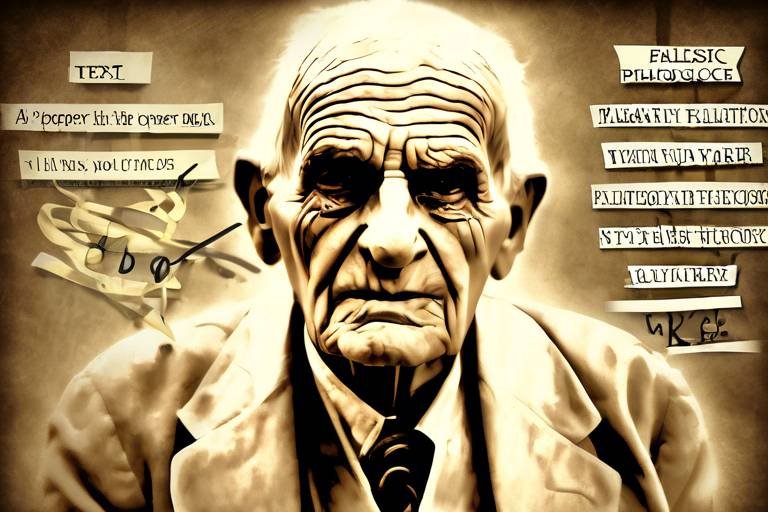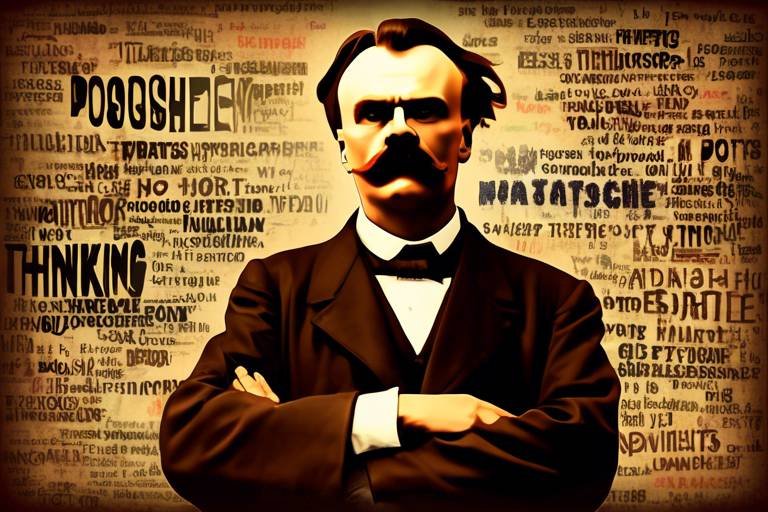A Look at John Locke and His Philosophy of Mind
John Locke, a towering figure in the realm of philosophy, has left an indelible mark on how we understand the mind, knowledge, and personal identity. His ideas, which emerged during the Enlightenment, challenged the status quo and prompted a seismic shift in philosophical thought. Imagine a world where knowledge isn't a given but something we build piece by piece—this is the essence of Locke's philosophy. He posited that our minds are not pre-loaded with ideas; instead, they are like blank slates waiting to be inscribed with experiences. This radical perspective not only reshaped the landscape of epistemology but also laid the groundwork for modern discussions on personal identity and the nature of self. So, what exactly did Locke propose, and why does it still matter today? Let's dive into his key ideas and explore how they continue to resonate in contemporary thought.
At the heart of Locke's philosophy lies his commitment to empiricism, the belief that knowledge arises from sensory experiences. For Locke, our understanding of the world is not something we are born with; rather, it is constructed through our interactions with our surroundings. Picture this: when you touch a hot stove, the pain you feel is not just a random sensation; it becomes a pivotal experience that teaches you to avoid danger in the future. This process of learning through experience is foundational to Locke's view of knowledge. He argued that every idea we possess originates from either sensation or reflection—essentially, what we observe and how we think about those observations. This approach challenges the notion of innate knowledge, suggesting instead that our minds are shaped by the world around us.
Locke's concept of the mind as a 'tabula rasa', or blank slate, is perhaps one of his most influential contributions. He proposed that individuals are born without built-in mental content, and that all knowledge comes from experience and perception. This idea was revolutionary, as it directly challenged the prevailing theories of innate knowledge that suggested humans are born with certain ideas or principles. The implications of this theory are profound, particularly in the fields of education and child development. If we view children as blank slates, it becomes crucial to consider the experiences and environments we provide them. After all, the knowledge they acquire will shape their understanding of the world and their place within it.
Locke's blank slate theory significantly influenced educational practices, advocating for a system that values experiential learning. He believed that education should not merely be about rote memorization but should instead focus on engaging students in their learning processes. By nurturing a child's environment and providing rich, diverse experiences, educators can help foster critical thinking and creativity. Imagine a classroom where students explore concepts through hands-on activities rather than just textbooks; this approach aligns perfectly with Locke's vision. It emphasizes the importance of context and interaction in learning, ultimately leading to a more profound understanding of the material.
Experience, according to Locke, is the cornerstone of knowledge formation. He argued that our ideas develop from the accumulation of experiences, each one contributing to the tapestry of our understanding. For instance, when we encounter a new concept, we relate it to previous experiences, allowing us to form connections and build a more comprehensive worldview. This process is akin to layering bricks to construct a sturdy building—each experience adds strength and depth to our knowledge. In this way, Locke's philosophy emphasizes that knowledge is dynamic and ever-evolving, shaped by our ongoing interactions with the world.
Locke's rejection of innate ideas did not come without its critics. Rationalists, such as Descartes, argued that certain concepts, like mathematical truths, must exist prior to experience. They believed that some knowledge is inherent to our nature as human beings. This debate between empiricists and rationalists continues to spark discussions in philosophy, as scholars examine the balance between innate knowledge and experiential learning. Locke's ideas invite us to question how we acquire knowledge and whether our understanding is truly a product of our experiences or if there are universal truths embedded within us.
Locke's views on personal identity revolve around the concepts of consciousness and memory. He posited that our identity is not tied to our physical form but to our psychological connections over time. In other words, it’s our memories and experiences that define who we are. Imagine meeting someone after many years; if they remember shared experiences, you can rekindle that connection, demonstrating how memory plays a crucial role in maintaining personal identity. This perspective has profound implications for understanding selfhood and continuity, suggesting that as long as we retain memories of our past, we remain the same person, regardless of physical changes.
Locke's ideas have left a lasting legacy on modern philosophy, especially in the realms of epistemology and political theory. His emphasis on empiricism has paved the way for countless thinkers who followed, shaping discussions around knowledge and belief. Moreover, his thoughts on individual rights and government by consent have profoundly influenced democratic ideals and political frameworks across the globe. Locke's philosophy is not just a relic of the past; it continues to inform contemporary debates on liberty, justice, and the role of government in our lives.
Locke's philosophy laid the groundwork for liberal thought, emphasizing the importance of individual rights and the necessity of government by consent. His ideas resonate in today's democratic societies, where the protection of personal freedoms is paramount. By advocating for the belief that legitimate government derives its authority from the consent of the governed, Locke challenged the divine right of kings and empowered individuals to demand their rights. This revolutionary concept has become a cornerstone of modern political theory, influencing documents like the Declaration of Independence and the Universal Declaration of Human Rights.
Locke's insights into the mind and knowledge have significantly impacted the field of psychology. His theories inform contemporary understanding of human behavior and cognition, particularly in areas such as developmental psychology and learning theory. By recognizing the role of experiences in shaping our thoughts and behaviors, psychologists can better understand how individuals develop over time. Locke's emphasis on the environment's influence on learning continues to be a guiding principle in educational psychology, highlighting the importance of creating nurturing spaces for intellectual and emotional growth.
- What is Locke's main contribution to philosophy? Locke is best known for his ideas on empiricism, personal identity, and the concept of the mind as a blank slate.
- How does Locke's theory of knowledge differ from rationalism? Unlike rationalists who believe in innate knowledge, Locke argued that all knowledge comes from sensory experiences.
- What impact did Locke have on modern education? Locke's emphasis on experiential learning has influenced educational practices, promoting environments that nurture critical thinking and creativity.
- How does Locke define personal identity? Locke defines personal identity through consciousness and memory, suggesting that our identity is tied to our psychological connections over time.

Locke's Empiricism
John Locke's philosophy is often celebrated for its robust empiricism, which posits that all knowledge originates from experience. Imagine trying to understand the world without ever having stepped outside your front door—Locke argues that such a scenario is impossible. Our minds are like blank canvases, waiting to be painted with the colors of our sensory experiences. Through sight, sound, touch, taste, and smell, we gather information that forms the building blocks of our understanding. This perspective radically shifts the focus from innate knowledge, which suggests we come into the world with pre-existing ideas, to a more dynamic process where our experiences shape who we are.
Locke believed that knowledge is constructed through two primary avenues: sensory experience and reflection. Sensory experience involves interacting with the world around us, while reflection is the process of thinking about those experiences. For instance, consider how you learned about the concept of 'hot.' Initially, you might have felt the warmth of the sun on your skin (sensory experience), and later, you might reflect on that feeling, comparing it to other experiences (reflection). Together, these processes create a rich tapestry of knowledge that evolves as we encounter new experiences.
To illustrate Locke's empiricism further, let's break it down into key components:
- Experience as the Source of Knowledge: According to Locke, all ideas and knowledge stem from our interactions with the world.
- Two Sources of Knowledge: Sensory experiences provide raw data, while reflection allows us to process and understand that data.
- Rejection of Innate Ideas: Locke challenges the notion that we are born with certain ideas or knowledge, emphasizing instead that our minds are shaped by our experiences.
Locke’s approach does not just change the way we think about knowledge; it also has profound implications for education and personal development. If we accept that knowledge is acquired through experience, then it follows that educational systems should be designed to encourage exploration and active engagement with the world. This is where Locke’s ideas resonate with modern educational philosophies that prioritize experiential learning over rote memorization.
In essence, Locke's empiricism invites us to embrace a world of discovery. It encourages us to be curious, to explore, and to recognize that our understanding of reality is not fixed but rather a constantly evolving narrative shaped by our experiences. As we navigate through life, every new experience adds a brushstroke to the canvas of our knowledge, making it richer and more nuanced.

Tabula Rasa: The Blank Slate Theory
John Locke's concept of tabula rasa, or the "blank slate," revolutionized the way we think about knowledge and learning. Imagine your mind as a clean canvas, free from any pre-existing images or ideas. This metaphor captures the essence of Locke's argument that individuals are born without innate knowledge. Instead, he believed that all understanding comes from experience, which is shaped by our interactions with the world around us. This idea challenges the long-standing belief in innate ideas, suggesting that knowledge is not pre-programmed but rather acquired through sensory experiences and reflection.
Locke proposed that our minds begin as a blank slate, ready to be filled with information as we encounter various experiences. This perspective has profound implications, not only for philosophy but also for education and personal development. For instance, if we accept that individuals are born as blank slates, it follows that the environment plays a crucial role in shaping a person's knowledge and character. Experiential learning becomes vital, as it emphasizes the importance of engaging with the world to gain understanding.
Locke's theory invites us to consider several key implications:
- Education: Educators can foster a child's natural curiosity and creativity by providing diverse experiences and opportunities for exploration.
- Personal Growth: Individuals have the potential to shape their own identities based on their experiences, rather than being confined to predetermined notions of who they are.
- Social Influence: Society and culture significantly impact how knowledge is acquired and understood, suggesting that learning is a communal process.
Moreover, Locke's rejection of innate ideas sparked intense debates among philosophers. Rationalists, who believed in inherent knowledge, challenged his views, arguing that some concepts, like morality or mathematics, must be hardwired into our minds. This ongoing conversation between empiricism and rationalism continues to shape philosophical discourse today.
In summary, Locke's tabula rasa theory not only reshaped our understanding of knowledge but also laid the groundwork for modern educational practices. By recognizing the importance of experience in learning, we can appreciate the dynamic nature of human development and the potential for growth throughout life.

Impact on Education
John Locke's blank slate theory fundamentally reshaped the landscape of education in ways that are still relevant today. By positing that the mind begins as a tabula rasa, or blank slate, Locke emphasized the importance of experience as the primary source of knowledge. This perspective suggested that children are not born with innate ideas; instead, they acquire knowledge through their interactions with the world around them. This view challenged traditional educational methods that relied heavily on rote memorization and passive learning. Instead, Locke's philosophy advocates for a more experiential approach to education, where learning is active, engaging, and rooted in real-life experiences.
Locke believed that education should be tailored to the individual child's experiences and environment. He argued that a nurturing and stimulating environment is crucial for intellectual growth. This means that educators should focus on creating learning experiences that encourage curiosity and exploration. For instance, instead of merely teaching facts and figures, teachers should guide students to discover knowledge through hands-on activities, discussions, and problem-solving tasks. Locke's emphasis on the role of experience in learning aligns with modern educational practices such as project-based learning and inquiry-based learning, where students are encouraged to ask questions and seek answers through exploration.
Moreover, Locke's ideas have led to the recognition of the importance of social and emotional learning in education. Understanding that children are influenced by their surroundings, educators are now more aware of the need to create a supportive and inclusive classroom environment. This approach fosters not only cognitive development but also emotional intelligence, helping students develop skills that are essential for their future success. In Locke's view, the development of the mind is not just about acquiring knowledge; it's also about nurturing a sense of self and building relationships with others.
To summarize, Locke's impact on education can be encapsulated in several key points:
- Experiential Learning: Knowledge is best acquired through active engagement and real-life experiences.
- Individualized Education: Each child's learning should be tailored to their unique experiences and environment.
- Social and Emotional Growth: Education should foster emotional intelligence and social skills alongside cognitive development.
In conclusion, John Locke's philosophy not only transformed educational practices in his time but also laid the groundwork for contemporary approaches to teaching and learning. His belief in the power of experience continues to resonate, reminding us that education is not just about filling minds with information, but about nurturing curious, thoughtful, and engaged individuals.

Role of Experience
John Locke's philosophy hinges on the idea that experience is the cornerstone of knowledge. He argued that our minds are not pre-equipped with ideas; instead, they are shaped by the experiences we undergo throughout our lives. Imagine your mind as a blank canvas, waiting for the vibrant colors of experience to paint it. This metaphor captures the essence of Locke's belief that all our concepts and knowledge arise from our interactions with the world around us.
Locke identified two primary sources of experience: sensation and reflection. Sensation refers to the direct experiences we gain through our senses—sight, sound, touch, taste, and smell. For instance, when you taste a juicy apple for the first time, that sensory experience creates a mental image and understanding of what an apple is. Reflection, on the other hand, is the process of thinking about our sensations and the ideas that arise from them. It’s like taking a step back and analyzing the colors on your canvas, considering how they blend and what they represent.
This duality of experience plays a vital role in shaping our beliefs and ideas. Locke believed that as we encounter various experiences, our minds begin to form connections and associations. For example, if you have a positive experience with a dog, you may develop a favorable view of dogs in general. Conversely, a negative experience, such as being bitten, might lead to a lasting fear. This highlights how our experiences not only influence our immediate reactions but also contribute to our long-term understanding of the world.
Moreover, Locke's emphasis on experience has profound implications for education. He argued that children learn best through active engagement with their environment rather than through rote memorization. This perspective encourages educators to create rich, interactive learning experiences that allow students to explore, experiment, and reflect. For instance, rather than simply reading about the water cycle, students might engage in a hands-on experiment to observe evaporation and condensation firsthand. This experiential learning fosters deeper understanding and retention, aligning perfectly with Locke's views on the role of experience.
In summary, Locke's philosophy underscores that our knowledge is not innate but rather constructed through our experiences. This foundational idea not only challenges previous notions of knowledge but also revolutionizes our approach to education and personal development. By recognizing the significance of experience, we can better appreciate how our interactions with the world shape our understanding and identity.
- What is the main idea of Locke's philosophy? Locke's philosophy emphasizes that knowledge comes from experience, challenging the notion of innate ideas.
- How does Locke's view influence education? His ideas promote experiential learning, encouraging active engagement rather than passive memorization.
- What are the two sources of experience according to Locke? Sensation and reflection are the two primary sources that shape our knowledge and understanding.
- Why is experience important in shaping our beliefs? Experiences create mental connections that influence how we perceive and understand the world.

Critiques of Innate Ideas
John Locke's rejection of the notion of innate ideas was a bold move that sparked considerable debate among his contemporaries and later philosophers. He argued that the mind is a blank slate at birth, and all knowledge is derived from experience. This assertion directly challenged the rationalist perspective, which posited that certain concepts and knowledge are inherent to the human mind, waiting to be discovered rather than learned.
One of the most notable critiques of Locke's empiricism came from the rationalists, such as René Descartes and Gottfried Wilhelm Leibniz. Descartes, for instance, believed in the existence of innate ideas, suggesting that concepts like mathematical truths are not learned through sensory experiences but are instead part of our mental architecture. He famously stated, "I think, therefore I am," implying that the very act of thinking is evidence of innate knowledge.
Leibniz expanded on this by arguing that while experiences shape our understanding, they do not account for the universal truths that exist independently of experience. He contended that humans possess an innate capacity for understanding concepts, which Locke's theory failed to acknowledge. This leads to a fundamental question: if our minds are entirely shaped by external experiences, how do we explain the ability to grasp complex ideas like justice or mathematics without direct experience?
Moreover, critics of Locke's theory often point out that if all knowledge is derived from experience, it raises concerns about the limitations of knowledge. For instance, how do we account for knowledge that seems to arise spontaneously, such as a child's ability to learn language? Critics argue that this suggests some form of innate understanding or predisposition. They pose the question: if knowledge is purely experiential, why do children across different cultures acquire language in remarkably similar ways?
Locke’s dismissal of innate ideas also led to discussions about the implications for education and development. If children are indeed blank slates, it emphasizes the responsibility of educators and society to provide rich and varied experiences to cultivate knowledge. However, this notion has been critiqued for oversimplifying the complexities of human development. Critics argue that innate tendencies may play a role in how individuals engage with and interpret their experiences, suggesting a more nuanced interplay between nature and nurture.
In summary, while Locke's empiricism has significantly shaped modern thought, the critiques surrounding his rejection of innate ideas highlight ongoing debates in philosophy and psychology. These discussions continue to influence how we understand knowledge, learning, and personal identity, demonstrating that the conversation is far from over.
- What are innate ideas? Innate ideas are concepts or knowledge that are believed to be inherent to the human mind, not acquired through experience.
- How did Locke's views differ from those of rationalists? Locke argued that knowledge comes exclusively from experience, while rationalists believed that some knowledge is innate and exists prior to experience.
- What is the significance of the blank slate theory in education? The blank slate theory emphasizes the importance of providing rich experiences for learning, suggesting that education should focus on nurturing a child's environment for optimal intellectual growth.

Personal Identity
When we think about , we often wonder, "What makes me, me?" This question has puzzled philosophers for centuries, but John Locke offered a refreshing perspective that revolves around consciousness and memory. According to Locke, our identity is not tied to our physical body or the substance of our being; rather, it is defined by our awareness of ourselves and our ability to remember past experiences. In his view, it is our consciousness that creates a continuous thread of identity over time.
Locke famously asserted that "the same consciousness is the same person." This means that as long as we can remember our past actions and experiences, we remain the same individual, even if our physical bodies change. Imagine you’re reading a book; each chapter represents a different stage of your life. While the chapters may vary in content, the narrative remains cohesive because of your ability to recall the events that shaped you. This analogy highlights how memory serves as the backbone of personal identity in Locke's philosophy.
One of the most intriguing aspects of Locke's theory is its implications for issues like responsibility and morality. If our identity is tied to our consciousness, then it follows that we are accountable for our actions only as long as we can remember them. This raises fascinating questions: What happens if someone suffers from memory loss? Are they still the same person? Locke's ideas invite us to explore the complexities of identity in a world where memories can be fragile and unreliable.
Locke's perspective on personal identity also invites us to consider the impact of our experiences on who we are. Every moment we live, every choice we make, contributes to the tapestry of our identity. This leads to a rich discussion about how our environment and interactions shape our consciousness. For instance, a person raised in a nurturing environment may develop a different identity than someone who faced adversity. In this sense, Locke’s theory emphasizes the importance of experience in the formation of our selves.
In conclusion, Locke’s exploration of personal identity through consciousness and memory has not only influenced philosophical thought but has also paved the way for modern discussions in psychology and cognitive science. By understanding identity as a fluid and dynamic concept, we can appreciate the complexities of human experience and the ongoing quest to define what it truly means to be oneself.
- What is John Locke's view on personal identity?
Locke believes that personal identity is rooted in consciousness and memory, rather than the physical body. - How does memory influence our identity according to Locke?
Memory allows us to maintain a sense of continuity over time, making us the same person despite physical changes. - What implications does Locke's theory have on accountability?
If identity is tied to memory, individuals may not be held accountable for actions they cannot remember. - How does Locke's perspective relate to modern psychology?
His insights inform contemporary understanding of identity, behavior, and cognitive development.

Influence on Modern Philosophy
John Locke's contributions to philosophy are nothing short of revolutionary, leaving an indelible mark that continues to resonate through the corridors of modern thought. His ideas, particularly in the realms of epistemology and political theory, have shaped the way we understand knowledge, governance, and individual rights. Locke's assertion that knowledge originates from experience laid the groundwork for empiricism, challenging the rationalist perspective that innate ideas exist within us from birth. This clash of ideas sparked a philosophical debate that still echoes today.
Locke's influence extends beyond mere academic discussions; it permeates our societal structures and individual beliefs. For instance, his concept of the 'social contract' has profoundly influenced democratic thought. By suggesting that governments derive their authority from the consent of the governed, Locke provided a philosophical foundation for modern democracy. This idea not only empowered individuals but also prompted a reevaluation of the relationship between the state and its citizens. His thoughts on governance can be summarized in the following key points:
- Individual Rights: Locke argued that every person possesses natural rights to life, liberty, and property, which must be protected by the government.
- Government by Consent: He believed that legitimate government arises from the agreement of the people, emphasizing the importance of civic engagement.
- Right to Revolution: If a government fails to protect the rights of its citizens, Locke posited that the people have the right to overthrow it.
These principles not only influenced the Enlightenment thinkers who followed him but also laid the groundwork for pivotal documents like the United States Declaration of Independence and the French Declaration of the Rights of Man and of the Citizen. Locke's ideas helped to cultivate a political landscape where individual freedoms and democratic governance became paramount.
Moreover, Locke's philosophy has had a lasting impact on the field of psychology. His exploration of the mind as a blank slate challenged the way we think about human development and behavior. By emphasizing the role of experience in shaping knowledge, he opened the door to understanding how our environment influences our thoughts, beliefs, and actions. This has led to a more nuanced view of human psychology, where factors such as upbringing, culture, and personal experiences play crucial roles in shaping who we are.
In summary, John Locke's influence on modern philosophy is profound and multifaceted. His ideas on empiricism, individual rights, and the social contract have not only shaped philosophical discourse but have also had practical implications for governance and psychology. As we continue to grapple with questions of identity, knowledge, and power, Locke's legacy remains a vital part of the conversation, reminding us of the importance of experience and the rights of individuals in shaping a just society.
- What is John Locke best known for? Locke is best known for his theories on empiricism, the social contract, and his views on personal identity.
- How did Locke influence modern democracy? His ideas about government by consent and individual rights laid the foundation for democratic principles that prioritize citizen engagement and protection of rights.
- What is the 'tabula rasa' theory? The 'tabula rasa' theory posits that individuals are born as a blank slate, and their experiences shape their knowledge and identity.
- What impact did Locke have on psychology? Locke's emphasis on experience as a key factor in knowledge formation has influenced modern psychological theories about human behavior and development.

Connection to Liberalism
John Locke's philosophy is often heralded as a cornerstone of liberal thought, significantly shaping the way we understand individual rights and the role of government. His ideas resonate deeply within the framework of modern democratic ideals, emphasizing the importance of personal freedom and the social contract. But what does this really mean? Essentially, Locke argued that individuals are born with certain natural rights—life, liberty, and property—which are fundamental to human existence.
Locke’s assertion that governments should exist only with the consent of the governed laid the groundwork for contemporary notions of democracy. In his view, the primary role of government is to protect these natural rights. If a government fails to do so, Locke believed that the people have the right to revolt. This revolutionary idea not only inspired the American and French revolutions but also continues to influence political discourse today.
To grasp the connection between Locke's philosophy and liberalism, it’s essential to consider a few key points:
- Individual Rights: Locke's belief in natural rights posits that every individual is entitled to certain inalienable rights, which must be respected by society and the state.
- Government by Consent: The legitimacy of a government, according to Locke, hinges on its ability to represent and protect the interests of its citizens, emphasizing a democratic framework.
- Social Contract: Locke's social contract theory suggests that individuals consent to form a government to safeguard their rights, creating a mutual obligation between the state and its citizens.
This connection to liberalism is not merely historical; it has profound implications for modern society. Locke's ideas encourage a participatory approach to governance, where citizens are not just subjects, but active participants in the democratic process. His influence can be seen in various political movements that advocate for civil liberties, social justice, and equality.
Moreover, Locke's thoughts on property rights underscore the belief that individuals should have the freedom to acquire and utilize resources as they see fit, contributing to economic liberalism. This aspect of his philosophy has fostered a capitalist economic system where innovation and entrepreneurship are celebrated.
In summary, John Locke's philosophical contributions provide a robust foundation for liberalism, advocating for a society where individual rights are paramount, and government is accountable to the people. His legacy continues to inspire movements that seek to uphold the principles of freedom and equality in the modern world.
1. How did Locke's ideas influence the Declaration of Independence?
Locke's assertion of natural rights and the government's responsibility to protect these rights directly influenced Thomas Jefferson's writing in the Declaration of Independence, particularly the phrases about life, liberty, and the pursuit of happiness.
2. What is the social contract theory?
The social contract theory, as proposed by Locke, posits that individuals agree to form a government to ensure their rights are protected, establishing a mutual obligation between the state and its citizens.
3. How does Locke's philosophy relate to modern democracy?
Locke's emphasis on individual rights and government by consent laid the groundwork for modern democratic principles, advocating for a system where citizens have the power to influence governance.

Legacy in Psychology
John Locke's philosophical insights have left an indelible mark on the field of psychology, shaping our understanding of human behavior and cognition in profound ways. His emphasis on empiricism—the idea that knowledge arises from sensory experience—has paved the way for various psychological theories that prioritize observation and experience over abstract reasoning. Imagine trying to understand a new recipe by merely reading about it without ever stepping into the kitchen; Locke would argue that true understanding comes from the experience of cooking it yourself. This idea resonates deeply within psychology, where experiential learning is often viewed as crucial for cognitive development.
Locke's concept of the mind as a tabula rasa or blank slate is another cornerstone of his legacy in psychology. This perspective suggests that individuals are not born with innate ideas but rather acquire knowledge through their experiences. This notion has significant implications for developmental psychology and education, as it underscores the importance of a nurturing environment in shaping a child's cognitive abilities. For instance, a child's exposure to diverse experiences—such as reading, social interactions, and problem-solving activities—can significantly influence their intellectual and emotional growth.
Moreover, Locke's thoughts on personal identity and consciousness have sparked discussions in psychology regarding the continuity of self. He proposed that personal identity is tied to memory and consciousness, suggesting that our sense of self is constructed through our experiences and the memories we retain. This idea aligns with contemporary psychological theories that explore how our past experiences shape our current behavior and self-perception. In essence, our memories act as threads that weave the fabric of our identity, constantly evolving as we encounter new experiences.
Locke's contributions also extend to understanding human behavior through the lens of motivation and learning. His ideas have influenced various psychological approaches, including behaviorism, which emphasizes the role of environmental stimuli in shaping behavior. By advocating for the importance of experience, Locke indirectly encouraged psychologists to explore how external factors influence learning and behavior. For example, consider how a child learns to ride a bike; the process involves trial and error, learning from falls, and gradually mastering the skill. This experiential approach to learning is foundational in many modern psychological practices.
In summary, Locke's legacy in psychology is characterized by his emphasis on experience, the development of the self, and the understanding of human behavior. His ideas have not only influenced educational practices but have also shaped the way we think about psychological development and identity. As we continue to explore the complexities of the human mind, Locke's insights remain relevant, reminding us that our understanding of ourselves and the world is profoundly rooted in our experiences.
- How did Locke's philosophy influence modern psychology?
Locke's emphasis on empiricism and the blank slate theory has shaped contemporary approaches to understanding human behavior and cognitive development. - What is the significance of the tabula rasa concept?
This concept suggests that individuals are shaped by their experiences, highlighting the importance of environment and education in personal development. - How does Locke's view on personal identity relate to modern psychology?
Locke's focus on memory and consciousness in defining personal identity aligns with current psychological theories that explore the continuity of self over time.
Frequently Asked Questions
- What is John Locke's philosophy of mind?
John Locke's philosophy of mind revolves around the idea that our understanding of the world is rooted in experience. He argued that knowledge is gained through sensory experiences and reflection, challenging the notion of innate ideas.
- What does the term "tabula rasa" mean?
"Tabula rasa," or "blank slate," is a concept introduced by Locke that suggests individuals are born without built-in mental content. Instead, knowledge is acquired through experiences, which shapes our understanding and beliefs over time.
- How did Locke's ideas impact education?
Locke's theories significantly influenced educational practices by promoting experiential learning. He emphasized the importance of a nurturing environment for children, encouraging educators to focus on developing critical thinking and observational skills.
- What role does experience play in Locke's philosophy?
Experience is central to Locke's philosophy, as he believed it is through various experiences that we form ideas and beliefs. Each interaction with the world contributes to our understanding and shapes our knowledge base.
- What are some critiques of Locke's rejection of innate ideas?
Locke's dismissal of innate ideas faced criticism from rationalists who argued that certain concepts are inherent to human beings. This ongoing debate highlights the tension between empiricism and rationalism in the realm of knowledge acquisition.
- How does Locke define personal identity?
Locke defines personal identity through consciousness and memory. He posits that our identity is maintained through psychological connections over time, meaning that continuity of self is tied to our memories and experiences.
- What is Locke's influence on modern philosophy?
Locke's ideas have had a profound impact on modern philosophy, especially in areas like epistemology and political theory. His thoughts on individual rights and government by consent laid the groundwork for liberal democratic ideals.
- How has Locke's philosophy influenced psychology?
Locke's insights into the mind and knowledge have shaped contemporary psychology by informing our understanding of human behavior and cognition. His theories continue to influence the development of psychological frameworks and research.



















